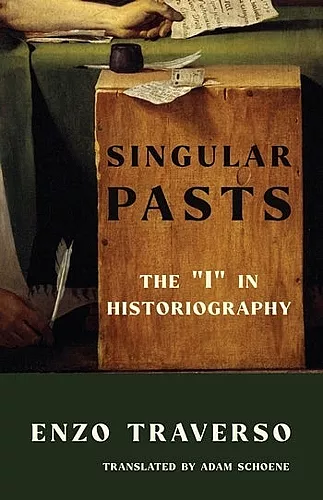Singular Pasts
The "I" in Historiography
Enzo Traverso author Adam Schoene translator
Format:Paperback
Publisher:Columbia University Press
Published:11th Oct '22
Currently unavailable, and unfortunately no date known when it will be back

Today, history is increasingly written in the first person. A growing number of historical works include an autobiographical dimension, as if writing about the past required exploring the inner life of the author. Neither traditional history nor autobiography, this hybrid genre calls the norms of the historical profession into question. In search of new and creative paths, it transgresses a cardinal rule of the discipline: third-person narration, long considered necessary to the objective analysis of the past.
Singular Pasts offers a critical account of the emergence of authorial subjectivity in historical writing, scrutinizing both its achievements and its shortcomings. Enzo Traverso considers a group of contemporary historians, including Ivan Jablonka, Sergio Luzzatto, and Mark Mazower, who reveal their emotional ties to their subjects and give their writing a literary flavor. He identifies a parallel trend in literature, in which authors such as W. G. Sebald, Patrick Modiano, Javier Cercas, and Daniel Mendelsohn write their works as investigations based on archival sources. Traverso argues that first-person history mirrors contemporary ways of thinking: such writing is presentist and apolitical, perceiving and representing the past through an individual lens. Probing the limits of subjective historiography, he emphasizes that it is collective action that produces social change: “we” instead of “I.” In an epilogue, Traverso considers the first-person writing of Saidiya Hartman as a counterexample. A wide-ranging and illuminating critique of a key trend in humanistic inquiry, Singular Pasts reconsiders the notion of historical truth in a neoliberal age.
How do historians place themselves in history? Should the historical be personal? With his familiar acuity of vision, breadth of erudition, and generosity of thought, Enzo Traverso supplies a rich array of answers to these abiding questions—usually boundary-crossing, sometimes surprising, always grounded in a carefully considered politics of knowledge -- Geoff Eley, author of Nazism as Fascism: Violence, Ideology, and the Ground of Consent in Germany, 1930-1945
Enzo Traverso has written an important book about first-person, more or less subjective and hybridized history—a much discussed and debated approach that has risen to prominence in the recent past. His erudite, insightful analysis extends more broadly to address questions about the very nature of history and its relations to other areas such as literature and film. It should interest not only historians but all humanists and social scientists as well as the general reader. -- Dominick LaCapra, author of Understanding Others: Peoples, Animals, Pasts
In this engaging book, Traverso guides us through the innumerable narrations of the past by contemporary writers and historians. Focusing on their interactions, he outlines what he deems a significant phenomenon in current historical writing: the growing intrusiveness of subjectivity and personal experience undermining a choral vision of the past. -- Carlotta Sorba, author of Politics and Sentiments in Risorgimento Italy: Melodrama and the Nation
In this sweeping review of recent histories written in the first person, at the crossroads between history and literature, Traverso offers a lucid analysis of this subjective turn and a sharp critique of this new ‘I’ that speaks of and for the past: that of ‘Historian Narcissus.’ -- Thomas Dodman, author of What Nostalgia Was: War, Empire, and the Time of a Deadly Emotion
Traverso's short and breezy survey...rings true. * New York Review of Books *
Sublimely readable. * Marx and Philosophy of Books *
ISBN: 9780231203999
Dimensions: unknown
Weight: unknown
216 pages